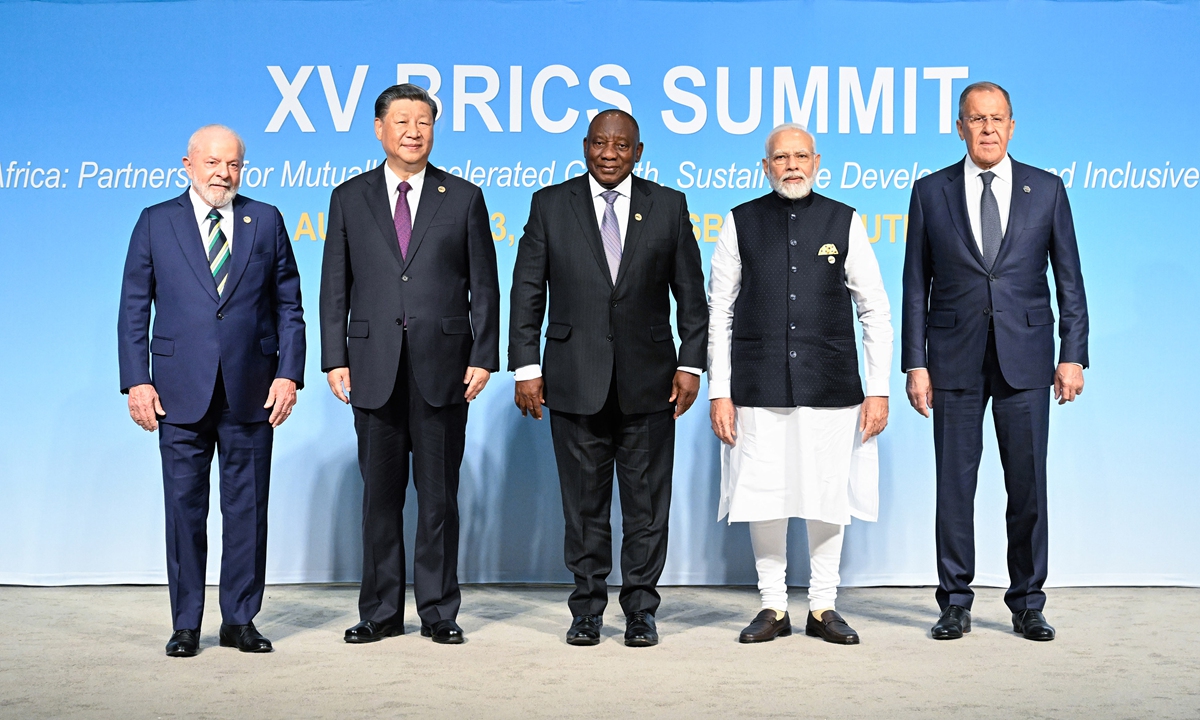
From left: Brazilian President Luiz Inacio Lula da Silva, Chinese President Xi Jinping, South African President Cyril Ramaphosa, Indian Prime Minister Narendra Modi and Russian Foreign Minister Sergey Lavrov (representing President Vladimir Putin) have a group photo at the 15th BRICS Summit held in Johannesburg, South Africa on August 23, 2023. Photo: Xinhua
On August 24 local time, South African President Cyril Ramaphosa announced at the BRICS Summit special press conference that six countries of Argentina, Egypt, Ethiopia, Iran, Saudi Arabia and the United Arab Emirate were invited to join the group. The much-anticipated list of BRICS expansion was thus revealed. The number of BRICS cooperation mechanism will increase from five to 11 in one step, exceeding expectations. This is a significant step for the BRICS cooperation mechanism and a major step for global governance. Ethiopian Prime Minister Abiy Ahmed stated that for Ethiopia, this is "a great moment."
Before the official expansion, many countries were eager to knock on the door of the BRICS, and 23 countries formally applied, which is a very rare scene in various multilateral cooperation mechanisms. The six new members who have been invited to join come from Asia, Africa, and Latin America. They are all regional countries with a certain scale and important influence. With their participation, the representativeness and influence of the BRICS cooperation mechanism will further increase, making it one of the largest representative organizations for emerging markets and developing countries to actively participate in global governance. It has great potential for promoting the development of global governance in a more just and fair direction.
The solidarity and consensus demonstrated by the leaders of the five countries participating in this BRICS Summit on core issues such as expansion have left a deep impression. Before the summit, many Western media outlets said that there were obvious differences within the BRICS regarding expansion and even said that China and Russia supported expansion while India, Brazil, and South Africa were reluctant. Their reports were full of instigation, claiming that China wanted to turn the BRICS into a platform to expand its influence and balance the West, attempting to interfere with cooperation among BRICS members. However, they clearly underestimated the determination of the BRICS members and other developing countries to unite and cooperate.
The leaders of India, Brazil, and South Africa all clearly expressed "full support" for expansion during the summit. The final outcome indisputably demonstrated the consensus of the five countries. It was not at all what the Western media had portrayed. Their biased speculation and provocation turned into sharp irony directed at themselves. The reversal and stark contrast over this matter have been particularly prominent in recent years, revealing the extent of the Western elites' misguided interpretations and misjudgments of the non-Western world. Often, with a single utterance from Western politicians and media, we already know what they're going to say, showing how even many ordinary people in the non-Western world can see through their narrative and logic. This is an artificially created asymmetrical global division.
Chinese President Xi Jinping mentioned the key word "solidarity" in his multiple speeches during the BRICS summit this time. At the press conference on Thursday, Xi stated that this expansion is historic and reflects the resolution of the BRICS countries to unite and cooperate with other developing countries. He called on BRICS members to work together to write a new chapter of solidarity and cooperation among emerging markets and developing countries for development. The day before, Xi delivered an important speech titled "Seeking Development through Solidarity and Cooperation and Shouldering Our Responsibility for Peace." Solidarity is strength, especially for developing countries.
Within the BRICS cooperation mechanism, whether China and India can overcome and transcend bilateral differences, disparities, and disputes to form a unified stance is considered by many to be a key factor in the effective functioning of BRICS. Meanwhile, this has also been used by Western countries as one of the reasons to doubt BRICS or as a leverage point to undermine it. Over the course of 17 years, BRICS hasn't been dissolved, but has instead continued to grow and strengthen. This undoubtedly demonstrates the successful coordination and consensus between China and India within the BRICS framework. They have not played into the script prepared by the West to counteract or hinder each other. These two ancient civilizations have displayed strategic breadth, seeking common ground while preserving differences, converging similarities while managing differences, and together constructing a cooperative and mutually beneficial global partnership. The atmosphere of solidarity and cooperation exemplified by the BRICS cooperation mechanism has also influenced more and more countries.
During the South Africa BRICS Summit, India's "Chandrayaan-3" probe successfully landed on the moon's South Pole. This achievement brought pride and jubilation to the entire India, with Indian Prime Minister Narendra Modi stating that "this success belongs to all of humanity." The Chinese people also agree with this. Meanwhile, China is also exploring the establishment of a "BRICS Global Remote Sensing Satellite Data and Application Cooperation Platform," utilizing advanced technology in areas like agriculture, ecology, and disaster reduction. These endeavors also belong to all of humanity.
As long as the spirit of BRICS is upheld, opportunities for cooperation and progress can be found everywhere. As more like-minded developing countries join BRICS, a stronger collective force will form, emitting a more resounding "BRICS voice," driving the world toward good governance.




